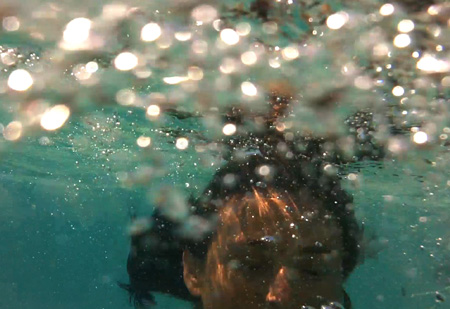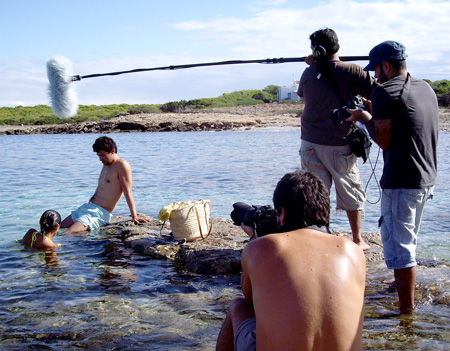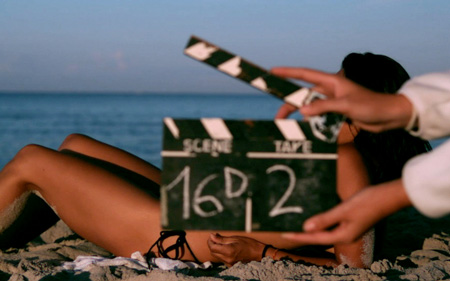
 "Plenamar" ("High Tide") is a fiction short-film directed by Joan Carles Martorell, written by Laia Ordóñez and produced by Cinètica Produccions in cooperation with IB3. The 17-minute short, filmed in Catalan, stars Lydia Sánchez, Rodo Gener and Santi Celaya. "Plenamar" premiered at the 2011 Seminci International Film Festival in Valladolid and won the prize for best Spanish short-film of the year at the 2012 Cortogenia Festival in Madrid. It is a story about a married couple and their friend who spend a weekend together sailing in the Mediterranean, off the southern coast of Mallorca.
"Plenamar" ("High Tide") is a fiction short-film directed by Joan Carles Martorell, written by Laia Ordóñez and produced by Cinètica Produccions in cooperation with IB3. The 17-minute short, filmed in Catalan, stars Lydia Sánchez, Rodo Gener and Santi Celaya. "Plenamar" premiered at the 2011 Seminci International Film Festival in Valladolid and won the prize for best Spanish short-film of the year at the 2012 Cortogenia Festival in Madrid. It is a story about a married couple and their friend who spend a weekend together sailing in the Mediterranean, off the southern coast of Mallorca.
«"Plenamar" is something like Cesc Gay in Mallorca, between "Dead Calm," "Knife in the Water," and Antonioni's "L'Avventura." No joke!» (Àlex Gorina, "Sala 33")
Director's Notes
About the Story
 Reading Helen Fisher's "Anatomy of Love" was a real eye opener for me. My friends and acquaintances alike know that I'm fascinated by stories about matters of love and Fisher's approach to how women love shed light on the mysterious, eternal and, ultimately, entertaining battle of the sexes. After discussing "the subject" with both male and female friends―exchanging opinions and sharing deep dark secrets which, once again, turned my naive and simplistic ideas about this topic upside down―the "Plenamar" story began to take shape in my mind. We could have said it was "based on real events," but perhaps better not to risk letting the cat out of the bag. One of the exciting aspects for both Laia Ordóñez and me in creating this short-film was its unusual slant on the subject. Western fiction is rife with adulterous men―both loved and hated―just as it is, though to a lesser degree, with adulterous women. Nonetheless, the latter have almost always had "moral justification" for cheating on their husbands: spite, revenge, escape, love, unhappiness, but rarely do we hear the powerful reasons why, according to experts on the subject and "my closest female friends," 40% of women are unfaithful to their partners. They have been so and will continue to be so, without considering leaving their husbands or partners; just sex for the sake of sex. As a colleague noted after seeing the first cut of the film, it's as though nothing really out of the ordinary happens in "Plenamar." That's the point: it's no big deal, and life just goes on.
Reading Helen Fisher's "Anatomy of Love" was a real eye opener for me. My friends and acquaintances alike know that I'm fascinated by stories about matters of love and Fisher's approach to how women love shed light on the mysterious, eternal and, ultimately, entertaining battle of the sexes. After discussing "the subject" with both male and female friends―exchanging opinions and sharing deep dark secrets which, once again, turned my naive and simplistic ideas about this topic upside down―the "Plenamar" story began to take shape in my mind. We could have said it was "based on real events," but perhaps better not to risk letting the cat out of the bag. One of the exciting aspects for both Laia Ordóñez and me in creating this short-film was its unusual slant on the subject. Western fiction is rife with adulterous men―both loved and hated―just as it is, though to a lesser degree, with adulterous women. Nonetheless, the latter have almost always had "moral justification" for cheating on their husbands: spite, revenge, escape, love, unhappiness, but rarely do we hear the powerful reasons why, according to experts on the subject and "my closest female friends," 40% of women are unfaithful to their partners. They have been so and will continue to be so, without considering leaving their husbands or partners; just sex for the sake of sex. As a colleague noted after seeing the first cut of the film, it's as though nothing really out of the ordinary happens in "Plenamar." That's the point: it's no big deal, and life just goes on.
The Production
 I feel very lucky with regard to the producers of my short films. Despite the major bureaucratic, weather and budget challenges we faced in making "Plenamar," it was a real pleasure to work with Luis Ortas (Cinètica Produccions). When we shot "Microfísica" ("Microphysics") we spent ten days moving from one end of Chicago to the other and in the case of "Plenamar" we tried to shoot in two sailboats during the ever-stormy, meteorologically-speaking, month of September in Mallorca. All sorts of things happened: accidents, doctors called to set, storms, cancellations and one morning I even found myself behind the camera lens because Nicolás (the Director of Photography) and Àlex (second unit camera operator) were stuck in two different ports. But in spite of all of that, and somehow magically, the shoot reached safe harbor. And that was thanks to the incredible team that was on board throughout the project. We hit the jackpot when casting the three fine actors, Lydia, Rodo and Santi. Almost all of the scenes involved improvisation and needless to say, they each invested a lot in that. They got drunk―for real―on camera, swam in frigid waters with no complaints, and kept their composure and good humor when crises occurred or rain poured down. Nothing would have been the same without Pablo, our sound man who was enthusiastic, super efficient and a soothing source of optimism, laughter and affection. Having Nicolás behind the camera was every director's dream come true: he knows what he's doing, is not put off by danger and exudes confidence. Since he couldn't be on set throughout the whole shoot, Àlex Marín, one of my favorite filmakers in the Balearic Islands, took over the photography and camera work at various times and did some excellent problem solving at various points along the way. I can't overlook the generosity and enthusiasm demonstrated by Toni Marqués, owner and skipper of «S'Avenc,» the featured sailboat in this story, as well as by Tià Estela, captain of the support boat on the shoot. They are two brave men who had no idea what they were getting into, but I'm sure they went away with fond memories of this adventure. And then there is Laia (writer, producer, coach, friend, and superwoman), who co-wrote "Plenamar." This short-film is also hers. If I can be considered one of its many "fathers"―because I firmly believe that filmmaking is a hard-won collective creative effort―she is, without a doubt, "the mother:" starting with the script and working closely with the actors and then battling with production issues. Greatly assisting us in the process were Laia's and Luis' right-hand woman, Caterina; Isabelle, at the editing stage; Lindsey, a grand cook; and Victòria Fullana who, bless her, opened her home to us in Sa Ràpita as though we were her children. I won't deny that I went through some hellish moments in the course of the production: the gods put our patience and self-esteem to the test on a daily basis. But we were lucky to sail through those rough waters as a strong team. All in all we shot enough film for a medium-length feature film. So, lesson learned: next time it will be a 90-minute movie.
I feel very lucky with regard to the producers of my short films. Despite the major bureaucratic, weather and budget challenges we faced in making "Plenamar," it was a real pleasure to work with Luis Ortas (Cinètica Produccions). When we shot "Microfísica" ("Microphysics") we spent ten days moving from one end of Chicago to the other and in the case of "Plenamar" we tried to shoot in two sailboats during the ever-stormy, meteorologically-speaking, month of September in Mallorca. All sorts of things happened: accidents, doctors called to set, storms, cancellations and one morning I even found myself behind the camera lens because Nicolás (the Director of Photography) and Àlex (second unit camera operator) were stuck in two different ports. But in spite of all of that, and somehow magically, the shoot reached safe harbor. And that was thanks to the incredible team that was on board throughout the project. We hit the jackpot when casting the three fine actors, Lydia, Rodo and Santi. Almost all of the scenes involved improvisation and needless to say, they each invested a lot in that. They got drunk―for real―on camera, swam in frigid waters with no complaints, and kept their composure and good humor when crises occurred or rain poured down. Nothing would have been the same without Pablo, our sound man who was enthusiastic, super efficient and a soothing source of optimism, laughter and affection. Having Nicolás behind the camera was every director's dream come true: he knows what he's doing, is not put off by danger and exudes confidence. Since he couldn't be on set throughout the whole shoot, Àlex Marín, one of my favorite filmakers in the Balearic Islands, took over the photography and camera work at various times and did some excellent problem solving at various points along the way. I can't overlook the generosity and enthusiasm demonstrated by Toni Marqués, owner and skipper of «S'Avenc,» the featured sailboat in this story, as well as by Tià Estela, captain of the support boat on the shoot. They are two brave men who had no idea what they were getting into, but I'm sure they went away with fond memories of this adventure. And then there is Laia (writer, producer, coach, friend, and superwoman), who co-wrote "Plenamar." This short-film is also hers. If I can be considered one of its many "fathers"―because I firmly believe that filmmaking is a hard-won collective creative effort―she is, without a doubt, "the mother:" starting with the script and working closely with the actors and then battling with production issues. Greatly assisting us in the process were Laia's and Luis' right-hand woman, Caterina; Isabelle, at the editing stage; Lindsey, a grand cook; and Victòria Fullana who, bless her, opened her home to us in Sa Ràpita as though we were her children. I won't deny that I went through some hellish moments in the course of the production: the gods put our patience and self-esteem to the test on a daily basis. But we were lucky to sail through those rough waters as a strong team. All in all we shot enough film for a medium-length feature film. So, lesson learned: next time it will be a 90-minute movie.
Joan Carles Martorell (October 2011)
Screenwriter's Notes
 "Plenamar" is a fictional story developed from a true story and a book. The true story made me really want to explore the roots and workings of female infidelity, and many clues to that could be found in Helen Fisher's book, "Anatomy of Love" (1992). I suspected, although I didn't know for sure at the time, that there were different behavior patterns, in contrast to male infidelity, that were present in the real story behind the fiction. And most of all, I suspected that female infidelity was/is much more common than what is generally believed or accepted to be true. And so, together with Joan Carles Martorell, we undertook the laborious task of researching the subject in endless essays, novels, films, poems plays and a long list of anonymous personal accounts of female infidelity. That was how we discovered interesting patterns of female behavior found in the most elaborate evolutionary theories, the most beautiful works of art and the most intimate personal secrets. In general, there were specific ways of behaving that set the unfaithful woman apart from the unfaithful man. "Plenamar" is, specifically, an exploration of how a woman can be unfaithful; but in broader terms it looks at infidelity as something that, if secretly maintained, can help to perpetuate rather than destroy a relationship.
"Plenamar" is a fictional story developed from a true story and a book. The true story made me really want to explore the roots and workings of female infidelity, and many clues to that could be found in Helen Fisher's book, "Anatomy of Love" (1992). I suspected, although I didn't know for sure at the time, that there were different behavior patterns, in contrast to male infidelity, that were present in the real story behind the fiction. And most of all, I suspected that female infidelity was/is much more common than what is generally believed or accepted to be true. And so, together with Joan Carles Martorell, we undertook the laborious task of researching the subject in endless essays, novels, films, poems plays and a long list of anonymous personal accounts of female infidelity. That was how we discovered interesting patterns of female behavior found in the most elaborate evolutionary theories, the most beautiful works of art and the most intimate personal secrets. In general, there were specific ways of behaving that set the unfaithful woman apart from the unfaithful man. "Plenamar" is, specifically, an exploration of how a woman can be unfaithful; but in broader terms it looks at infidelity as something that, if secretly maintained, can help to perpetuate rather than destroy a relationship.
 Developing the script for "Plenamar" was a lengthy process because we wanted all of the details in the characters' lives and the relationship among them to reflect the conclusions that many other observers on the subject had reached. From the start, both the director and I were clear that the entire film had to feel immediate and natural in a way that is only possible through improvisation. We wanted the viewer's attention to focus more on subtleties, body language, facial expressions, double meanings, subtexts, flirtations, smiles and glances, than on the words. It was also important, however, that when those words were spoken they would smoothly and painlessly ring true to the viewer without sounding like prefabricated pills of information. So, in spite of the fact that the first versions of the script included dialogue, it gradually became clear that the best path to take was guided improvisation: the script needed only to provide the lines of action establishing the content and development of the characters' conversations, expressions, intentions and feelings, but nothing more. At the start I was a bit resistant to the idea, but Joan Carles had no doubts and we got the results we were hoping for. On a different note, in order to maintain the freshness of the performances during the shoot, rehearsals with the actors focused less, to the extent possible, on actual scenes of the film and more on acting out earlier episodes of the characters' lives that don't actually appear in the film; the aim was to help the actors internalize the backstory of these three characters before they embarked on their weekend sailing trip together off the island's coast.
Developing the script for "Plenamar" was a lengthy process because we wanted all of the details in the characters' lives and the relationship among them to reflect the conclusions that many other observers on the subject had reached. From the start, both the director and I were clear that the entire film had to feel immediate and natural in a way that is only possible through improvisation. We wanted the viewer's attention to focus more on subtleties, body language, facial expressions, double meanings, subtexts, flirtations, smiles and glances, than on the words. It was also important, however, that when those words were spoken they would smoothly and painlessly ring true to the viewer without sounding like prefabricated pills of information. So, in spite of the fact that the first versions of the script included dialogue, it gradually became clear that the best path to take was guided improvisation: the script needed only to provide the lines of action establishing the content and development of the characters' conversations, expressions, intentions and feelings, but nothing more. At the start I was a bit resistant to the idea, but Joan Carles had no doubts and we got the results we were hoping for. On a different note, in order to maintain the freshness of the performances during the shoot, rehearsals with the actors focused less, to the extent possible, on actual scenes of the film and more on acting out earlier episodes of the characters' lives that don't actually appear in the film; the aim was to help the actors internalize the backstory of these three characters before they embarked on their weekend sailing trip together off the island's coast.
Laia Ordóñez (October 2011)
Music
Original Sountrack
The original "Plenamar" soundtrack was composed, performed and sound mastered by Ferran Cruixent, who has worked together over the years with Joan Carles Martorell on some film projects.
Closing credits song
The song that appears over the credits and in the film's trailer is a remix of "Mi hermana" composed and performed by Roldán. The song was first released on the "El cantar" CD (2008, AA Records) and remixed for this film by Rafael Martínez.
Creative Commons Licence
 The short-film "Plenamar" has a Creative Commons BY-NC-SA license. That does not mean that the film is not copyrighted but rather that it is available a priori for uses not permitted under traditional copyright law.
The short-film "Plenamar" has a Creative Commons BY-NC-SA license. That does not mean that the film is not copyrighted but rather that it is available a priori for uses not permitted under traditional copyright law.
So, with this license, anyone is free to:
- Copy the film
- Distribute the film
- Screen the film
- Remix and recut the film
Only, however, under the following conditions:
- The filmmakers' names are cited
- It is not ever used for commercial purposes, examples of this being screening it at any film festival or theater that charges an entrance fee; posting it on any video-sharing website with paid advertising (such as Youtube or the like); broadcasting it on any TV channel with paid advertising; selling any DVD copies of the film; and/or any other related commercial activity
- Any spin-off work must have the same BY-NC-SA license
More details here.
Credits
Erica: Lydia Sánchez | Marc: Rodo Gener | Albert: Santi Celaya
director: Joan Carles Martorell | screenplay: Laia Ordóñez | executive producer: Luis Ortas | production company: Cinètica Produccions | associate producer: Joan Carles Martorell | head of production: Laia Ordóñez | production assistant: Caterina Mas
director of photography: Nicolás Pinzón | second unit: Àlex Marín | camera operators: Nicolás Pinzón, Àlex Marín, Joan Carles Martorell | editors: Isabelle Fournet, Joan Carles Martorell | color correction: Emma D. González (Infinia)
sound: Pablo Gregorio | mixer: Jordi Monrós (Fig Tree) | dialogue editor: Diego Casares | sound assistant: Eduardo Povea | original music: Ferran Cruixent | end credits song: "Mi hermana" by Roldán | remixed by: Rafael Martínez (Grabaciones de Campo)
shipmasters: Toni Marqués, Tià Estela | catering: Lindsey Mackay | accountability: Óscar Tarazona | graphics: María Castelló Solbes | this film is inspired by the book: "Anatomy of Love" by Helen Fisher
thanks: Joan Rigo, Ana Gómez, Sergio Hernández, Andrés López Mengual, Miquel Àngel Aguiló, Toni Verd, Pep Cerdà, Joan Barceló Fullana, Victòria Fullana, Juan Martorell, Lucero Velásquez, Maria de Lluc Morey, Pere Morey, Meritxell Antigua, Javier Ojeda, Juan Diego Pecci, Luis Vicente Serrano, Jordi Ordóñez, Lidia Pagán, Nuria Perea, Felipe G. Gil, Rafa Cortés, Manuel Bermúdez, Iskra Karadzhova, Nina Bendzko, Port de Sa Ràpita
with the support of: IB3 Televisió de les Illes Balears, Parc Audiovisual de Catalunya, Festival Baumann de Terrassa, Catalan Films & TV, Institut Ramon Llull
© 2011 Cinètica Produccions SL
Festivals
- Semana Internacional de Cine de Valladolid, Seminci 2011 - La Noche del Corto Español
- Certamen Cortogenia, Madrid 2012 - First Prize
- Festival de Cannes 2012 - Short Film Corner
- Festival du Court Métrage à Clermont-Ferrand 2012 - Short Film Market
- Cinespaña, Festival du Cinéma Espagnol de Toulouse 2012 - Official Section
- London Spanish Film Festival 2012 - Catalan Window
- Paris Courts Devant 2012 - Invite l'Espagne
- FEC Reus Cambrils 2012 - Official Section
- Fic-Cat Costa Deurada 2012 - Official Section
- Ca Revolta, València 2011 - Official Section
- Maremostra, Palma 2012
- Mèdit, Menorca 2012
- Summer Film Festival, Strelka Insitute, Moscow 2012
- Creative Commons Festivals Network 2012-2013 (Spain, Colombia, Chile, Finland)
- Festival International Cinema Libre, Hamburg 2013 - Official Section
- Kisafilm, Istambul International Short Film Festival 2013 - Spain, Special Selection





